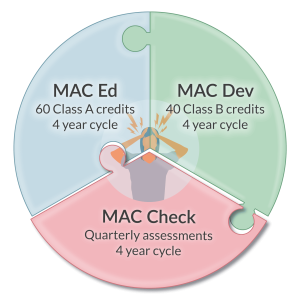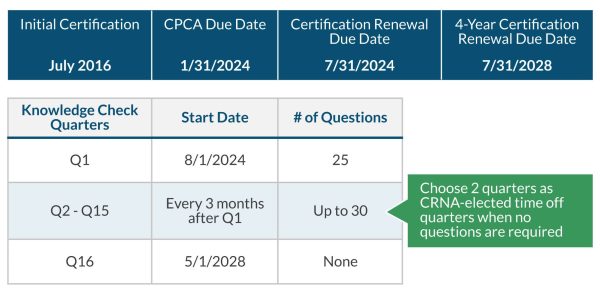Have you heard? The NBCRNA is transitioning the CPC Program to the Maintaining Anesthesia Certification (MAC) Program. This represents a significant shift towards a more streamlined approach to CRNA recertification.
You’re not alone if you’re confused by the never-ending changes to CRNA recertification. With lots to unpack, we’re here to demystify how this affects your recertification journey.
Table of Contents:
- Does APEX Offer Everything I Need for the MAC Program?
- When will I start the MAC Program?
- Three Components of the MAC Program
- What is MAC Ed?
- What is MAC Dev?
- What is MAC Check?
- How often will I complete MAC check?
- What happens if I don’t meet the MAC Check performance standard?
- Will I earn Class A or B credits for completing MAC Check?
- Should I study for MAC Check?
- Do I need to complete the CPC Assessment?
- Do I need to complete the CPC Core Modules?
- How much does the MAC Program cost?
- Get started on your MAC requirements
Does APEX Offer Everything I Need for the MAC Program?
Absolutely! We know you’re busy, so we have several convenient bundles that give you all the Class A credits you need for your entire 4-year MAC Program.
- MAC Program Bundle
- CRNA Essentials Bundle
- All-Inclusive Bundle
Click here to choose the bundle that’s best for you.
When will I start the MAC Program?
The short answer is that it’s NOT the same for everyone.
Entry into the MAC Program is personalized, depending on your current certification cycle. No doubt, this will create a lot of confusion, so don’t assume that the information “helpful” colleagues share on social media necessarily applies to your situation.
Starting on August 1, 2024, CRNAs in the following three groups will start the MAC Program:
- CRNAs in their second CPC cycle with a certification renewal deadline of July 31, 2024.
- CRNAs in their first CPC cycle with a certification renewal deadline between January 2024 – July 2024.
- CRNAs who passed the NCE and received their initial certification between January 2024 – July 2024.
If you do NOT fall into one of these three groups, the NBCRNA will notify you when it’s your turn to transition (all CRNAs will be enrolled in the MAC Program by 2026). In the meantime, you’ll complete your current CPC cycle requirements.
Here’s an article that tells you everything you need to know about your CPC Program requirements.
Additionally, you can check your NBCRNA member portal for your personalized requirements.
Three Components of the MAC Program

You’ll complete the three components of the MAC Program in every 4-year recertification cycle.
- MAC Ed = Class A continuing education (60 Class A Credits)
- MAC Dev = Class B professional development activities (40 Class B Credits)
- MAC Check = Quarterly knowledge checks, replacing the CPCA
Your 4-year cycle is divided into 16 quarters. Before we discuss how this affects you, let’s explore what you need to know about the three components of the MAC Program.
What is MAC Ed?

- Earn 60 Class A credits every 4-year cycle (same as the CPC Program).
- Class A credits must be prior-approved by an accredited organization (AANA, ANCC, or ACCME) and must contain some form of assessment to demonstrate that learning has occurred.
- Examples of Class A credit activities include online courses, webinars, and workshops.
- APEX has everything you need to complete your MAC Ed requirements.
- This requirement has not changed from the CPC program requirements.
What is MAC Dev?

- Earn 40 Class B credits every 4-year cycle (same as the CPC Program).
- Class B credits do not require prior-approval from an accredited organization.
- Examples of Class B credit activities include research, publishing, teaching, and mission trips. Here is a complete list of professional development activities that award Class B credits for MAC Dev.
- You must keep records of your Class B credits to provide to the NBCRNA when you recertify.
- If you don’t want to deal with the hassle of earning and keeping track of your Class B credits, you can earn additional MAC Ed (Class A credits) over the required 60 that will count towards your MAC Dev (Class B) requirement.
What is MAC Check?

MAC Check replaces the CPC Assessment by introducing longitudinal assessment through quarterly knowledge checks. This process supports lifelong learning at more frequent intervals throughout your career.
Here’s what to expect with MAC Check:
- Log into the NBCRNA platform (3rd party CE vendors do NOT offer MAC Check).
- 25 questions in your first quarter.
- 30 questions in each subsequent quarter.
- Question types include multiple choice and multiple correct response.
- Some questions will be grouped into a clinical scenario
- Timed for 1 minute per question.
- If you answer a question incorrectly, you’ll encounter it again in a subsequent quarter. Re-administered questions make up to 5 incorrectly answered questions in each quarter, totaling between 25 to 30 questions.
- Content covers the four core domains of nurse anesthesiology: airway management, clinical pharmacology, human physiology & pathophysiology, and anesthesia equipment & technology.
- Immediate feedback and rationales after each question.
- Personalized recommendations on improvement areas to include in your continuing education activities.
- Checks are accessible online (via desktop or mobile), without proctoring, offering flexibility to complete or pause as needed.
- You must complete your quarterly knowledge assessments on time. Failure to do so puts your certification in jeopardy.
- Once you have completed 4 Mac Check quarters, you’ll receive preliminary feedback to see where you stand in regards to the performance standard. After the 13th knowledge check is completed, you’ll receive a final measurement for that cycle.
- Although MAC Check is not a pass/fail test, you must satisfy a predefined performance standard. MAC Check will assess your performance over time, and the NBCRNA will let you know if you don’t meet the standard in any of the four core domains.
How often will I complete MAC check?
Your 4-year cycle is divided into 16 quarters. This is where things start to get complicated. Don’t worry, we’ll break it down piece-by-piece and give you an easy to follow example.
- Complete 13 knowledge checks in quarters 1 – 15, with a choice to skip 2 quarters.
- No checks in the 16th quarter. This quarter is used for remediation
- You can’t complete more than one knowledge check per quarter.
Here’s a sample schedule for a CRNA who enters the MAC Program on August 1, 2024.
What happens if I don’t meet the performance standard for MAC Check?
Failure to meet the MAC Check performance standard requires earning 5 remedial (additional) Class A credits in each domain where the standard isn’t met.
- Failure to meet 1 performance standard = 5 additional Class A credits
- Failure to meet 2 performance standards = 10 additional Class A credits
- Failure to meet 3 performance standards = 15 additional Class A credits
- Failure to meet 4 performance standards = 20 additional Class A credits
For clarity, the additional Class A credits needed for remediation are in addition to your total 100 credit requirement. For instance, if you fail to meet the performance standard in the airway management domain, here’s what you’ll need for your 4-year cycle:
105 total credits = 5 remediation credits (must be Class A) + 60 Class A + 40 Class B
⚠️ You’ll need to complete 5 additional Class A credits in any domain where you don’t meet the MAC Check performance standard.
The NBCRNA will tell you whether or not you meet the performance standard at the end of Q13. This gives you a few months between receiving notice and earning your remediation CE credits.
Will I earn Class A or B credits for completing MAC Check?
No. You will not earn credits for completing MAC Check. However, MAC Check provides ongoing feedback you can use to inform which type of content you should consume to meet your MAC Ed (Class A credit) requirement.
Should I study for MAC Check?
Whether you study is up to you. If you’re looking for review content, we have several courses that will help you:
- Back to Basics is our CRNA review course that refreshes the foundational knowledge of anesthesia practice.
- CRNA CE Mastery QBank gives you 25 quizzes to practice for MAC Check. You’ll earn Class A credits as you pass each quiz.
Do I need to complete the CPC Assessment?
Once you begin the MAC Program, you can say “goodbye” to the CPC Assessment and say “hello” to quarterly knowledge checks! This shift means more frequent, though less intensive, interactions with the NBCRNA.
Instead of taking a CPC Assessment every 8 years, you’ll complete 13 quarterly knowledge checks in each 4-year recertification cycle.
⚠️ CRNAs in their second CPC cycle must complete the CPC Assessment BEFORE entering the MAC Program.
Do I need to complete the CPC Core Modules?
If you’re currently in the CPC program, you must complete all your current CPC cycle requirements, including the CPC Core Modules, before transitioning to the MAC Program. This includes all CRNAs with a recertification deadline in 2024 and 2025.
⚠️ CRNAs currently in the CPC Program must complete all current cycle requirements – including the CPC Core Modules – BEFORE entering the MAC Program.
Once you enter the MAC Program, CRNA Core Modules won’t be required. At this point, they become optional, still offering a time-efficient way to earn Class A credits and stay up to date on anesthesia practice.
How much does the MAC Program cost?
There are two fees that you’ll pay when you start the MAC Program:
- $295 application fee (unchanged from the CPC Program)
- $160 MAC Check platform fee that covers your entire 4-year cycle. No prorating option is available (e.g., retirement).
Get started on your MAC requirements
As always, APEX is here to help you get the CRNA continuing education you need conveniently and cost-effectively. When you’re ready, we’re here to help.








